Weston Cutter's Blog, page 20
May 26, 2013
Richard Lange’s Fantastic ANGEL BABY + Free Book
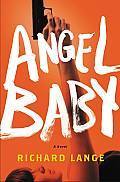 Richard Lange‘s last book THIS WICKED WORLD hit in 2009, and his collection DEAD BOYS was before that, meaning: you may have heard of him already. I hope you have. If you haven’t already heard of him and gotten on board, fear not: now is your time. Lange’s new book ANGEL BABY has just been released, and I shit you not, dear reader: this is among the year’s very best books (which is saying a good bit, given that this year’s already had great stuff from Brian Kimberling and Jean Thompson and Bob Hicok and Jess Walter and Susan Steinberg and Holly Goddard Jones and there’s still stuff coming from Lindsay Hunter and Laura van den Berg and Paul Yoon and Alissa Nutting and the great Pelecanos and Robert Boswell and etc. etc. etc.). ANGEL BABY could real easily be pegged as a nice, pulpy beach read, a fizzy thing one gives to fathers to knock off their one-a-year book quota, but Lange’s latest is larger than the genre it’ll be tried to fit into. It’s a crime book, certainly, but you should approach this book the same as you would a Richard Price novel: crime’s there, but the world of the book is the size of the very world.
Richard Lange‘s last book THIS WICKED WORLD hit in 2009, and his collection DEAD BOYS was before that, meaning: you may have heard of him already. I hope you have. If you haven’t already heard of him and gotten on board, fear not: now is your time. Lange’s new book ANGEL BABY has just been released, and I shit you not, dear reader: this is among the year’s very best books (which is saying a good bit, given that this year’s already had great stuff from Brian Kimberling and Jean Thompson and Bob Hicok and Jess Walter and Susan Steinberg and Holly Goddard Jones and there’s still stuff coming from Lindsay Hunter and Laura van den Berg and Paul Yoon and Alissa Nutting and the great Pelecanos and Robert Boswell and etc. etc. etc.). ANGEL BABY could real easily be pegged as a nice, pulpy beach read, a fizzy thing one gives to fathers to knock off their one-a-year book quota, but Lange’s latest is larger than the genre it’ll be tried to fit into. It’s a crime book, certainly, but you should approach this book the same as you would a Richard Price novel: crime’s there, but the world of the book is the size of the very world.
ANGEL BABY is one long chase: in the first few pages, Luz—a drug kingpin’s wife—makes a bloody escape from the life she’s been trapped within, and fleeing sets all other pieces in motion: folks are hunting her, folks are helping her, and all the characters swirl in a Tijuana-to-Cali cast that’s got as much breadth and flesh and blood among them as you could hope for in a book (for real: there’s a character who shows up for all of like maybe 5 pages—he’s loaning a car to one of the main characters—and there’s a moment that exposes precisely, perfectly who he is, and the moment’s devastating, and you’ll understand when you read it). Anyway, plenty: this is the book to be reading, people. I’ve got a free copy of the book to give away, so email me (wlcutter[at]hotmaildotcom) by Wednesday 5/29 and I’ll pick a winner thereafter (US addresses only).
And now: here’s an email interview conducted with Richard a week or so back. For real: put ANGEL BABY on whatever list it is you keep.
This might be a stupid question, but here goes: do you feel any sense of *anything* re genres—any sense of responsibility, or where you’d fall on a theoretical map, or whatever? My friends and I got into DEAD BOYS and read it as literary fiction. Sure, it was pulpy and dark, but ultimately it was offering the sort of sentence-level glories of lit fiction. I fear I’m dancing around it. Here: there’s Lahane and Price and maybe five other guys (they’re all guys, that I can tell) who write genre stuff that’s also considered ‘literary.’ Not that many. I’ve wondered lots about it. It seems the two—dark/crime/genre and literary—are antagonistic, to a degree. Does it feel that way, to you, from inside? How do you square that stuff? Is it something you’ve thought of, at all, ever?
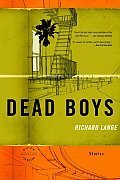 I don’t put myself into any category as a writer, I just write. “Crime” “Literary crime,” and “neo-noir” are the terms most often used to describe the books, even Dead Boys, which has very little actual “crime” in it. I’m more about character, milieu, and language than plot. That said, however, I prefer novels with plot, or at least plenty of incident, something to pull me along. I never planned to write novels, so when I had to write This Wicked World in order to get a two-book deal with Dead Boys, I was nervous about writing long. I decided to take a structure I was familiar with, the murder mystery, and use that as a template to write about the people, places, and situations I was interested in. I was trying to make things easier on myself, and I figured that by having certain milestones imposed on me by the plot structure, I’d be reminded to keep moving along and have a road map to lead me through the writing of the book.
I don’t put myself into any category as a writer, I just write. “Crime” “Literary crime,” and “neo-noir” are the terms most often used to describe the books, even Dead Boys, which has very little actual “crime” in it. I’m more about character, milieu, and language than plot. That said, however, I prefer novels with plot, or at least plenty of incident, something to pull me along. I never planned to write novels, so when I had to write This Wicked World in order to get a two-book deal with Dead Boys, I was nervous about writing long. I decided to take a structure I was familiar with, the murder mystery, and use that as a template to write about the people, places, and situations I was interested in. I was trying to make things easier on myself, and I figured that by having certain milestones imposed on me by the plot structure, I’d be reminded to keep moving along and have a road map to lead me through the writing of the book.
With my second novel, Angel Baby, I wanted a less-convoluted plot, something more basic, and I hit upon the idea of a chase. Once again, I was looking for something that would pull me and the reader through the book while allowing me to write about the characters I’d created and giving me some interesting and exciting situations to put them into. This Wicked World, yeah, I can see why they called it a crime book. It has the bones of one. But Angel Baby? I don’t know. What exactly is the crime in that one? To me, it’s a study of five desperate people going to desperate lengths to get what they want. I wanted to write about Tijuana. I wanted to write about La Mesa Prison. I wanted to write about Compton and Tecate and Luz and Malone.
Critics and editors and publicists can call the books whatever they want. It’s their job to shorthand stuff. I get the luxury of putting no labels on what I do. And if calling me a crime writer sells more copies, I’m all for it. If I can write what I want and actually sell books, that’s great!
What was the learning curve like between THIS WICKED WORLD and ANGEL BABY? I don’t want to venture too much—I liked the former well enough—but there feels like…there feels some massive, massive power unleashed in ANGEL BABY that I at least didn’t find as easily in THIS WICKED WORLD. Did it feel that way from inside of the writing as well? Was this novel easier than its predecessor?
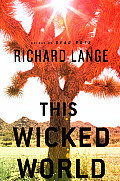 With This Wicked World, I was feeling my way through the process as I wrote it, learning as I went along. I found myself wrestling with plot a lot, and vowed that this time, on Angel Baby, I’d simplify that aspect in order to concentrate more on the things I mentioned before, character, setting, and language. Perhaps that’s what you’re responding to. I also spent a year writing stories between the two novels, and I always learn a few new narrative and stylistic tricks from working shorter. Angel Baby wasn’t easier to write than This Wicked World, but I had more confidence in my ability as a writer and a real determination to assert more control over the tone of what I was writing.
With This Wicked World, I was feeling my way through the process as I wrote it, learning as I went along. I found myself wrestling with plot a lot, and vowed that this time, on Angel Baby, I’d simplify that aspect in order to concentrate more on the things I mentioned before, character, setting, and language. Perhaps that’s what you’re responding to. I also spent a year writing stories between the two novels, and I always learn a few new narrative and stylistic tricks from working shorter. Angel Baby wasn’t easier to write than This Wicked World, but I had more confidence in my ability as a writer and a real determination to assert more control over the tone of what I was writing.
More about this novel, as well: how long did it take to write? And how did it get its start—was it Luz, was it the actual opening of the book, with her making her get-away?
Angel Baby took a year and a half to write. This Wicked World took two years. The first thing I came up with for Angel Baby was the character of Malone. I read a story in the L.A. Times a number of years ago about a white American burnout who was driving illegals across the border for a Mexican pollero, and that stuck with me. Luz and the other characters came along later, as I started sketching out the story in my head. When I settled on a chase as the structure, Luz moved to the forefront and took over.
And this might be a silly, too-noodly question, but I’m real, real interested: how much did you know, and when did you know it, on writing through ANGEL BABY? I don’t want to give stuff away to readers who haven’t gotten through the thing yet, but I want to specifically ask about the characters who die in this story. How far into the book did you get before you realized who wouldn’t make it to book’s end? And (I apologize if this gets too nerdy or whatever) how do you decide who dies? It seems like a tremendously tough decision; part of me is frustrated that one of the characters who died in this book did, simply because his was a heartbreaking story that simply kept getting worse. It seems like a sort of moral calculus, and I can’t even imagine what goes on in that character-based number crunching, and any light you’d like to cast on that process would be deeply welcomed.
That character you’re talking about was set to die from the very start. He was doomed. Another character was also supposed to die, but got a reprieve as the book developed. When people used to ask what I was working on, I’d say I was writing the saddest novel ever written. Some readers bitched about the “happy” ending of This Wicked World, and maybe I was reacting to that. By the time I got about halfway through Angel Baby, though, I’d decided that it wasn’t going to be the saddest novel ever written, just a very sad one. So, in answer to your question, the story ended up dictating who lived and died. The book wouldn’t have worked like it does if I’d stuck to my original plan, and I was on the ball enough to see where things were going and adjust my course.
How is your stuff California literature, or does that even matter? It obviously is (CA lit), again and again, if for nothing other than the fact that it’s all set there, but is there something *Californian* about your stories, your characters, the stuff that goes down? I truly don’t know (and wouldn’t be able to hazard a guess, given that the CA spectrum includes TCBoyle, Sal Plascencia, Aimee Bender, etc.), but I’m curious if you’ve got any considerations on this (for the record: I’m from Minnesota, and I’m clueless about what midwest writing is, but a week doesn’t pass that I don’t wonder about what it is, or what it includes or is like).
I’m a California writer because I’ve lived here all my life and because I set my stories here, but I’ve never set out to write “California” stories. I like to have certain amount of “truth” when it comes to milieu, so I write about places I’m familiar with. That means Southern California, specifically. So, of course, my books will have beaches in them and Hollywood and the desert and glimpses of the various groups who have moved here seeking better lives (Latinos, Asians, Armenians, Midwestern beauty queens). Also, there’s this interesting mixture of hopefulness and bitter disappointment that fills the air in L.A., a byproduct of the dreamers of all stripes who make their way here. And that leads to a certain desperateness that shows up in my work in a lot of different ways. Like, “If I can’t make it here, what the fuck is wrong with me?” Southern California is the end of the known world for a lot of people, their last stand, and that makes it a great place to write about.
Do you have a preference between stories and novels? In an interview, you mentioned that after THIS WICKED WORLD you’d planned to go back to stories next, but now here we are, 4 years later, with another novel instead (though you’re publishing stories still, of course, in big literary journals, and getting in Best Mystery Writing, and etc.). I guess the question is: how much do you plan regarding what comes next for you, writing-wise?
As I mentioned earlier, after This Wicked World I went back to stories for a year, using my Guggenheim money to support myself. When that started running out, I decided it was time to begin another novel, because I might actually have a chance of selling a novel, whereas the stories weren’t making me a dime. As soon as I finished Angel Baby and got a check for it, I went back to stories and finished a new collection that’s about to go out to publishers. I’ve started another novel, and there will be another one after that. So, yeah, I do have a vague plan. A couple of years ago I would have told you that I prefer writing stories to writing novels because of the freedom the story form allows – no plots to contend with, no “connective tissue” to try to make interesting for the reader and myself, no months and months of slogging with no end in sight. As I neared the end of this collection, though, I found myself looking forward to beginning a new novel. I craved structure. So maybe I’m evolving, I don’t know. There’s also the career consideration. I write for a living, and you can’t make a living writing short stories.
Are there contemporaries of yours, or folks you’re reading at present, who blow your mind? I guess this is a fan-ish question along the lines of: I like your stuff a whole lot, and can find some aspects of your work in other places, but I’d love to know what you read, would love to trace through your own list of what you like.
My reading is all over the place. There’s always a classic. The last one was Defoe’s A Journal of the Plague Year, and currently it’s The Odyssey. I’m also reading Train Dreams by Denis Johnson, whose Jesus’ Son changed my writing life, and I’m about to finish Long, Last, Happy, the Barry Hannah collection. There’s also Book 1 of Shelby Foote’s Civil War history and a Vietnam guidebook for an upcoming trip. I also read the L.A. Times from cover to cover every day. I just finished Jerry Stahl’s new one, Happy Mutant Baby Pills, which will be out in November, and George Pelecanos’ The Double, which is out in October. Both were excellent. The last book that really knocked me on my ass was 2666 by Roberto Bolano. I pooh-poohed him as a flavor-of-the-month until my girlfriend forced me to pick it up. It’s one of those books where the author has to teach you to read it (Absalom, Absalom comes to mind), so it takes a little time to get into, but if you stick with it, the rewards are immense and lasting. You feel like a gnat as a writer when you finish something like that. But in a good way.


May 21, 2013
Four New Ones
The Summer of Beer and Whiskey by Edward Achorn
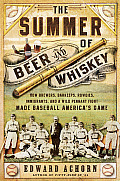
This is a book about, real generally, the 1883 baseball season, and, specifically, a guy named Chris Von der Ahe, who founded the team that’d become the St Louis Cardinals (before that: Browns). Here’s what I can say: I love me some baseball, and I absolutely put my infant daughter in a MN Twins onesie yesterday in hopes that doing so would help my team halt their sudden SIX GAME slide (it didn’t work). What I mean is: I care about baseball a fair amount. I bring that up because: The Summer of Beer and Whiskey is, in its way, rivetingly good reading, and is great: I had but the dimmest notions of what baseball could’ve been like 130 years ago, and this book certainly does a very good job establishing what that world of baseball was like (drunker, wilder, bawdier—it reads, honestly, a bit as if baseball then was like a drunker version of minor-league [or midwest league, anyway] ballteams at present). Baseball, too, at the time (in the 1880′s) was losing popularity, dropping in public significance, etc. This Von der Ahe helped inject a massive jolt into the sport, and this book’s the record of that, and it’s a fine, interesting, illuminating book (the hedging you might feel throughout this review is that this isn’t necessarily a barn-burning page-turner of a book—it was work, for me—and there’s a sepia in the writing that can get wearying). Still: good enough.
I Want to Show You More by Jamie Quatro
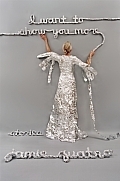
This is as good as everyone said it was. So fucking good. Here’s how good it is: you don’t realize, as you’re reading it, that it’s actually amazing. You know that feeling? It’s akin to the first time you hear someone like Bon Iver (or lately, for me, Laura Marling): you don’t notice how good what you’re hearing is because it sounds so natural, so easy. Here’s a proposition: it’s easy to respect/be amazed by someone like Wallace or whoever because it’s clear how much work that takes. Harder to parse the glory of is smaller, more domestic stuff—Quatro, obviously, or Caitlin Horrocks, or Jean Thompson. Anyway, enough: get this fucking book. Holy shit is she good. I am 100% certain I’ll be coming back to this collection before this year’s out. That sort of good.
River Bend Chronicle by Ben Miller
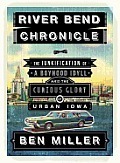
Here’s what you should think when reading this book: JEAN SHEPHERD. If you don’t know that name: he was a famous radio personality and hosted a show that was freewheeling and wild and amazing, but he’s since become more famous for having written and narrated A Christmas Story. Regardless: it’s the shaggy, all-inclusive voice and idea and animating spirit of Shepherd that seems (to this reader/reviewer) to be guiding River Bend Chronicle, which is subtitled “The Junkification of a Boyhood Idyll Amid the Curious Glory of Urban Iowa.” Miller’s a fine guide, if (I think) overwindy: there’s a too-muchness in this memoir that (for me) burdens the reader more than 100% necessary for the enterprise (that could actually though have just as much to do with the fact that Miller’s writing style’s comprised of pages-long paragraphless chunks [these chunks are complete packages, on their own, but one does eventually feel exhaustion on coming up on one each time; it’s akin to engaging in a gchat with someone who never just says “I’m good, how are you?” but instead details *everything*). I mean no disrespect on any of this: Miller’s scope is LARGE (the prologue, I kid you not, runs from page 3 to 49). If you’re willing to do such lifting, you’re rewarded with a story about an eccentric family in the 1960s and 1970s, in the Quad Cities in Iowa (Rock Island, specifically), and one kid’s attempts to make sense and meaning of all of it.
Critique of Pure Reason by Gabriel Blackwell
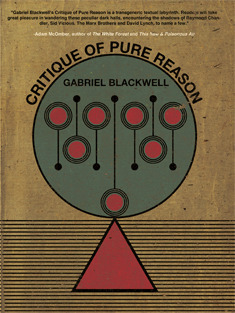
I’ll read anything by Gabriel Blackwell at this point. I don’t know if this was just perception, or what, but it felt, in the 90s/00s, that there was much more interesting experimental stuff going on in fiction, which experimental stuff specifically tasked itself with wrestling through/into various forms (I may believe that simply because I came of readerly age at that time, so maybe I should just say that it felt like that in those years for me). I bring it up simply because Blackwell’s stuff is awesomely, interestingly experimental, but formally experimental: “Story (with Dog)” operates as a large-scale if-then set up (“IF a character A exists SUCH THAT character A is human AND is male AND has been vacationing in Yalta for a week and a half AND is married to a tall, erect woman with dark eyebrows…” that’s the first bit of the first paragraph/sentence, which, yes, wraps up with a then). I guess the thing is that the title’s not cutesy: this is a book ultimately addressing or attempting to engage with aesthetic and emotional concerns through the bakery or shop or kiosk of math or logic or reason, and I’ll here cop to a pretty firm readerly hunger for such moves, and Blackwell (as he did with Shadow Man, which was a genre-breaking thing as well) delivers. Again.


May 15, 2013
Three New Ones
(before anything else: this came up this wknd at the Rumpus. Anyway)
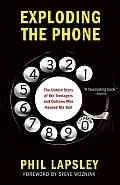 Exploding the Phone by Phil Lapsley
Exploding the Phone by Phil Lapsley
I feel terrible for now having gone far too long without shouting about this book. I’ve yapped before about two other books which are up the same alley as this: there’s Something in the Air by Marc Fisher, which is a history of radio, and there’s Perfecting Sound Forever by Greg Milner, which is a history of recorded music. I’m not sure if there’s any obvious or overt way these three books overlap—they’re microhistories, sure, and written by guys, but past that I’m not sure. But here’s the deal: Exploding the Phone is sas good a book of nonfiction you’ll read this year, and you need to read the thing as soon as you possibly can. In the most basic way, it’s a history of phone phreaking (if you know what a blue box is, or know anything about Cap’n Crunch, you needed this book yesterday). In a far more fleshed-out and interesting way, it’s a book about the invention of a system (the phone system, specifically) and the people who came in after the system was made and were interested in the system—in understanding it more fully, finding its strengths and weaknesses, etc.
Phone phreaking was the precursor to computer hacking, in its way: when phone systems ran on analog carrier systems, the system ran on sounds, on actual tones, and some people were keenly, deeply intruiged by the fact that there were specific combinations of tones that allowed their users to make free long-distance telephone calls—which, certainly, was a huge deal (I grew up in the 80s and 90s, a time of $.25/minute long-distance charges, and the height of phreaking was earlier, when prices were even crazier). And sure, of course: objectively phone phreakers were breaking the law, and were stealing from Ma Bell. But the thing that’s most engaging and wonderful about Lapsley’s book (which, let’s note, features a foreward from Woz of Apple, a phreaker himself with his pal SJobs) is how it highlights the sort of exploratory pleasure that actuall drove phone phreaking: most of the young men who actually were interested in it and who got involved were interested in phreaking more as an untellectual pursuit, interested in the challenge of the thing.
If you’re lucky, you have friends like that—friends who are enamored of systems and want to know more about it. One of my close friends—the first person I recommended this book to—works IT, and he *loved* this book—because, ultimately, whatever poking around he’s done online, perfectly legal or otherwise, has been animated by insatiable curiousity. It’s easy to make scary books and movies about black hat hackers who rob folks blind, and it’s easy to dismiss all those acts as crimes when we only consider them in such contexts; the panties get harder to bunch when we all realize that some folks who are testing the bounds of security are driven by curiousity, by the same engineer’s what-if that drove, well, folks like Steve Jobs. Who knows. Maybe that’s not the case, and maybe Exploding the Phone is just a real sweet almost halcyon book about the good old days before digital and everything else, when technological crimes were almost aw-shucksishly quaint. I’d like however to posit though that the book’s a gigantic grinning what if, a thick, riveting read that should, if you’re doing it right, reconfigure whatever certainties you think you’ve got about those folks benignly fascinated by systems. This is as close to a necessary book as I can imagine this year.
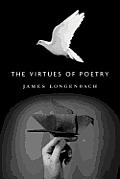 The Virtues of Poetry by James Longenbach
The Virtues of Poetry by James Longenbach
I teach poetry every semester, and one of the hardest things to do, semester-in, semester-out, is walking through a poem’s moves. I don’t know the terms everybody else uses for this act, but all it means is to go very very slowly through a poem trying to note all it’s doing (with language, image, meaning, etc). The reason it’s so hard to do a walk-through with a class is both 1) sure, poetry’s sort of hard, but more significantly 2) most folks have never ever come across a decent walk-through of a poem before. Most of us have not spent all that much time or energy keeping our ear very close to a poem, for pages and pages of thinking and consideration. What’s hard about that work, of course, is simply this: attention. In fact, almost *anything* is easier than trying to sit quietly and think/work/walk through a poem.
All of which is preamble to say: James Longenbach’s The Virtues of Poetry is glorious and beautiful and is the smartest book I know of which tries to apply itself to walking through some poems. Here’s how good Longenbach is: I don’t like Ashbery. Don’t get his work, don’t care for it, have read lots of it. Longenbach’s chapters on the man are the first things I’ve read that’ve made understanding Ashbery even seem like something worth attempting. More than that: Longenbach, throughout The Virtues of Poetry, helps slot individual poems in a larger context of the development of poetry, a gift to the reader almost inestimably large. It’s a colossal book—get this now. For real. Also, this review at the Sycamore Review is far better than this one I just did.
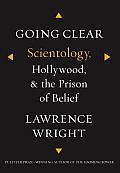 Going Clear by Lawrence Wright
Going Clear by Lawrence Wright
This came out too long ago now (January)—surely you’ve made up your mind. Maybe you haven’t. If you haven’t: get and read this fucking book. Please note that this is the most balanced and level-headed and generous assessment of a consistently controversial *thing* I could imagine: read the book as balm for yr own curiousity about Scientology, fine, but also read it to be amazed by the breadth of Lawrence Wright’s soul, basically, and how he can (I think) present a monumentally human and humane picture of an organization lots of us don’t know all that much about. It’s a stunner. But, again: you should’ve gotten it in January.


May 11, 2013
An Interview with Jean Thompson
 Jean Thompson‘s been on my list since I don’t remember when. Her collection of stories Who Do You Love was my first exposure, and her last two novels—2011′s The Year We Left Home and the very recently released The Humanity Project—are both so quietly fantastic that it’s hard to even get a grip on them. Here’s what happens when you read Thompson: you read her fiction (and she’s equally good at short stories and novels, so, really, just take your pick), and you shut the book, and there are some sentences maybe that hang with you, and certainly there are characters and moments they lived/moved through which cling to yr head, but what you’ll likely feel is simply that you just came in contact with a very good book. What happens next, though, is the magic: you keep living, and you maybe read another book or three, or you see a movie, hang out with friends, whatever. Time passes in which you live, and about a week after you finish a Thompson book, you realize that her fiction somehow does a better job of capturing the felt experience of lived reality better than almost anything. That, at least, is what happens to me: Ms Thompson’s plenty stunning at the sentence level, but her work ultimately ends up meaning so much (at least to me) because years later I’m still thinking not just about characters of hers but actual scenes—I’m still picturing what I pictured years back while reading something. I can say that about few writers and their work. She’s incredible. You should absolutely be reading her. Below is an email she graciously took part in over email recently.
Jean Thompson‘s been on my list since I don’t remember when. Her collection of stories Who Do You Love was my first exposure, and her last two novels—2011′s The Year We Left Home and the very recently released The Humanity Project—are both so quietly fantastic that it’s hard to even get a grip on them. Here’s what happens when you read Thompson: you read her fiction (and she’s equally good at short stories and novels, so, really, just take your pick), and you shut the book, and there are some sentences maybe that hang with you, and certainly there are characters and moments they lived/moved through which cling to yr head, but what you’ll likely feel is simply that you just came in contact with a very good book. What happens next, though, is the magic: you keep living, and you maybe read another book or three, or you see a movie, hang out with friends, whatever. Time passes in which you live, and about a week after you finish a Thompson book, you realize that her fiction somehow does a better job of capturing the felt experience of lived reality better than almost anything. That, at least, is what happens to me: Ms Thompson’s plenty stunning at the sentence level, but her work ultimately ends up meaning so much (at least to me) because years later I’m still thinking not just about characters of hers but actual scenes—I’m still picturing what I pictured years back while reading something. I can say that about few writers and their work. She’s incredible. You should absolutely be reading her. Below is an email she graciously took part in over email recently.
How did The Humanity Project begin? What was the hook or shelf on which the whole thing began to be built? Mostly I’m interested in this because of how widely it travels.
The genesis of The Humanity Project: I wanted to write something that was somewhat larger in scale than, say, the story of two people in a marriage gone bad. (Not that there’s anything wrong with that…) The expansive title is something of a clue. I wanted to pose the question — not necessarily answering it — how we cope with difficult times (economic, personal, environmental), how do forces beyond our control shape us? Fairly quickly I decided on a structure of different characters taking turns with different chapters. I wanted one hard-luck guy, Sean, and I set about multiplying his sufferings, like God did to Job.
Then there’s a somewhat organic, somewhat manipulated process of building on to that first narrative, as in, what if Sean had a son? What if there was another guy, another father, having to cope with a much more troubled teenager? What if this second guy had a downstairs neighbor, who happened to work for an old lady, who happened to employ the son, etc. I did want the characters to begin as separate story lines that gradually cross and intersect. It always interests me when those sorts of coincidences occur in our actual lives, though I posit no theory of cosmology that explains it. But I did want to reinforce the idea that we’re all in this together, whatever “this” comes to mean in the book.
This might be totally impossible, but I’m curious if you feel that there’s a contemporary school or group of writers with whom you either a) feel aesthetically aligned or b) see your work as being aligned with. I’ve got ideas of folks whose work seems engaged in similar stuff as yours (James Meeks’s The Heart Breaks In, for instance), but I’m curious.
I suppose I think less about particular writers — though I like the idea that those of us working with similar material might form some kind of literary street gang — but rather about inhabiting a particular turf. In my case, that’s the continent of the real, or what is now being called “the social novel”, which I interpret as novels about a recognizable world, and those of us who populate it. There are other continents out there, labelled Fabulism, or Crime, or Vampires. Plenty of land for everyone!
This is entirely personally motivated, but I’m curious if writing’s gotten harder since you no longer are full-time teaching. On the one hand: the idea of writing full time sounds fantastic; that said, I feel like I at least would have a really hard time being totally internal and on my own—I end up liking how teaching forces me out of myself, into the world. Clearly I’m projecting, but I’m still curious.
I get a lot more writing done now that I am not teaching, and in fact wonder how I ever managed to accomplish anything while I had a full-time job. Answer: I was younger then, had more energy, and didn’t know any better. I do think that one needs to engage with the world in whatever way is available. If not via the workplace, then wherever else the world presents itself. There are times I miss having colleagues, and being part of a community of writers, and of course, wonderful things can and do happen in the classroom. But I do not miss looking for parking spaces, climbing the same set of stairs for the umpteenth time, and department meetings, department meetings, department meetings.
I apologize if the following comes across as anything other than 100% respectful: do you, or did you while writing The Humanity Project, get at all nervous or anxious about portraying harrowing stuff like a school shooting? Here’s the background: I was at Virginia Tech, and lots of us have tried to write about not even *that* shooting, but just shootings or school violence in general since, and there’s this weird aspect of respect for or deference to the horror of it that has, far as I can tell, tripped up quite a few of us. Is there a difference, for you, in writing about something that large and fraught? (for what it’s worth: the moments of the shooting in THP were amazing, and Linnea’s experience was incredible, and harrowing, and goose-bump inducing).
First, in the matter of school shootings, and your experience at Virginia Tech: what a dreadful thing to have experienced first-hand, and I am sorry for that. It does not surprise me that any of you who
witnessed and survived it have difficulty in writing about it. There is trauma, there is, as you say, respect and deference. You may find that with time the experience itself settles and becomes somewhat easier to approach, in either fictional or non-fictional ways. Just as novels about war are often written some years after the fact of them, it takes time to digest what happened, and also, what it might really “mean” to you, that is, what persists and needs to be addressed.
As for my treatment of the same sort of event – wholly imagined on my part – yes, of course there was anxiety, wishing to be convincing without being exploitative. The shooting in my book is an unexplained act. Even the shooter’s mother has no real insight into him. And I don’t attempt to enter his head or provide him with motivation. I would not be capable of doing so. I wanted what we call “random, senseless violence” dropped into my characters’ lives, to see what sort of rippling effect it would have on this fictional world. I wanted the event to be terrible without seeming sensationalized, and I am glad to hear that you thought it worked.
Do you think of yourself as a midwest writer? Does such a categorization even remotely come into your world or bearing? I’m a very very proud midwesterner (from Minnesota, currently in Indiana), and lots of writers I really enjoy happen to be from here, or based here (RPowers with you there in U-C, Wallace before California, Roxane Gay, Ander Monson, etc. etc. etc.), and I inevitably ask this question simply because I don’t think there’s anything like an answer or anything, but I’m always curious how those writers who live in the midwest process or consider that effect/aspect on/of their work.
Am I a midwest writer? Well, we grow where we are planted, though it’s hard to identify a common thread among myself and any of the writers you mention. And “The Humanity Project” is largely set in northern California – a place I lived for a time – so on occasion, I take my act on the road. I don’t know if there’s a midwest sensibility or regionalism in the same way you can speak of southern regionalism, nothing that makes any of us particularly hip, exotic, quaint, etc. We’re all just folks here.
(I’m stealing this Q from Roxane Gay’s interview of Meg Wolitzer in Bookforum): what do you like best about your writing?
I think I’m a pretty fair psychologist, of fictional creations, at least. And sometimes I am inordinately fond of a particular turn of phrase, and sometimes these hold up under scrutiny.
Finally: what’s the view out your window?
My back garden waiting for me to plant, weed, dig, clip, and otherwise exert myself.


May 5, 2013
Little Wolves by Thomas Maltman
I’m almost always a fan o...
Little Wolves by Thomas Maltman
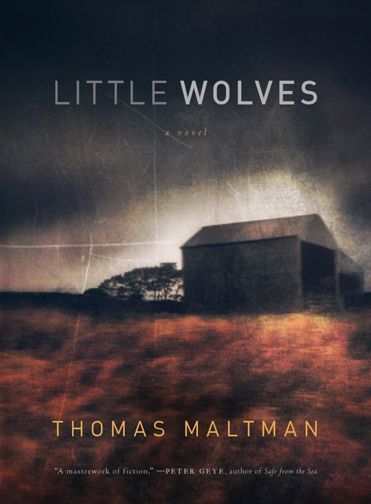 I’m almost always a fan of books that can turn a landscape or region into its own kind of character. Cormac McCarthy comes to mind, and of course Mark Twain. I’m inclined to add Thomas Maltman, author of Night Birds, to this list: the eloquent grittiness of Little Wolves derives in large part from the author’s masterful understanding of setting.
I’m almost always a fan of books that can turn a landscape or region into its own kind of character. Cormac McCarthy comes to mind, and of course Mark Twain. I’m inclined to add Thomas Maltman, author of Night Birds, to this list: the eloquent grittiness of Little Wolves derives in large part from the author’s masterful understanding of setting.
Based loosely on true events, Little Wolves takes place in the stark Minnesota prairies some thirty years ago. The story begins with the seemingly unprovoked murder of the town sheriff by a troubled teen named Seth, whose father Seth, Sr.–or Grizz, as he is known around town–suddenly finds his quiet farmer’s life overturned as the townsfolk rally against him for justice. In the midst of the turmoil following the sheriff’s death, Grizz befriends Clara, wife of the town’s new minister and Seth’s (former) English teacher. In fact, as the plot wears on we come to find that perhaps Clara knew more about the troubled outcast than she or anyone else really knew.
While Clara and Grizz are not exactly original character types (the gruff, down-on-his-luck farmer who just needs to be loved; the secretly faith-doubting English teacher who just doesn’t fit in with the rest of the town’s conservative Lutheran women), they balance each other out nicely, and Maltman takes pains to ensure that they are well-developed, especially Grizz, whose tumultuous relationship with his late son is rendered with unsettling realism, as are his manic efforts to move past the tragedy and instead focus on his own grueling farm life.
If there’s any strike to draw against Little Wolves, it’s Maltman’s tendency toward artsy, only-kinda-relevant subplots, namely Clara’s fascination with Norse and Anglican mythology. Several of the gods of this pantheon are employed for symbolism, which isn’t entirely uninteresting, but it doesn’t really seem necessary, either. Rather, it seems at times like exactly that, a heavy-handed attempt at symbolism, one that ultimately doesn’t contribute much to the narrative. The same could be said for the back story concerning Seth and the sheriff: I have no doubt that these things could be engrossing in a Grishamy sort of way, but at the moment they feel unfinished, like roads left unpaved.
But then, one gets the impression that Maltman was actively working against the Grisham thriller model, focusing instead on character and place and letting the tension unfold from there. Which it does, and beautifully so. Little Wolves is flawed, certainly, but in a way that seems strangely fitting considering its gritty aesthetic. Most of its missteps are minor and are largely the result of Maltman’s commendable efforts to maintain the story’s integrity.
The Bartender’s Tale by Ivan Doig
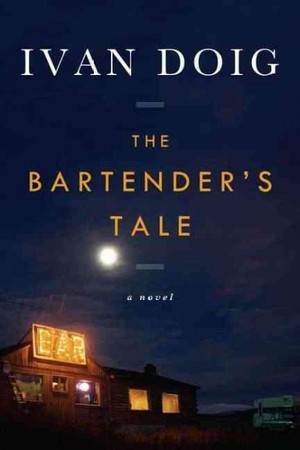 I tried to get into this one. I really did. I thought, A coming-of-age story set in rural Montana in the 60s? That’s got me written all over it!
I tried to get into this one. I really did. I thought, A coming-of-age story set in rural Montana in the 60s? That’s got me written all over it!
But of course, as anyone will tell you, there’s only so much you can do with this kind of tale, and it takes a truly masterful writer to really surprise his/her audience with a new spin on it. Unfortunately, Ivan Doig is not that writer.
We begin with 12-year-old Rusty Harry, our narrator, being picked up from his aunt’s house–where he’s been living for the past several years–by his father Tom Harry, who has abruptly shown back up in the boy’s life. Tom owns and operates the Medicine Lodge, the only decent watering hole in the tiny town of Gros Venture. It’s a predictably shabby place frequented by minors and truckers and any number of disreputable characters whom Rusty eagerly observes from the back room of the bar, where his father stashes him during business hours. Not surprisingly, things take a turn for our narrator when 12-year-old Zoe Constantine (really, that’s her name) movies into town with her parents. Rusty finds himself drawn to her for reasons he doesn’t understand, this friend with whom he explores the strange little town and blah blah blah.
I mean, look: it’s not that it’s a bad story, it’s just that it feels incredibly anachronistic, even wistful. And I get that that’s not exactly the author’s fault–we write what we know, don’t we? Except that, well, it sort of is, because a lot of the things that were interesting in books during Rusty’s era (Tom’s pompadour, for instance, which Doig is really just waaaaaay too excited about) aren’t interesting now. And in fact, one could argue that Doig is actually channeling the restrospectively streamlined early sixties of, say, Leave it to Beaver; NPR‘s Carmen Gimenez Smith, for example, points out that even the drunk, unruly, unrefined bar patrons speak in PG prose, as does pretty much everyone else in the book.
The point being, I suppose, that The Bartender’s Tale doesn’t necessarily present us with a version of the past so much as another family-friendly version of the past, one that I’m sure Doig remembers fondly but that nonetheless feels stale and plastic. It’s a shame, too: all the pieces are there for something really special, but the author is reluctant to take any risks. The book is quaint and charming, but probably not in the way he intended.


April 27, 2013
Recent Poetry: Phillips, Szybist, Leithauser
I should just make a list of poets whose names I know but whose works I don’t, and I should post them somewhere so when I finally get off my ass and get my mind blown by well-known and -established writers, I can at least feel chagrined: of course this guy’s amazing, I can say, he’s been on the radar for how long now? Recent such discoveries for me include Lucie Brock-Brodio, and Eamon Grennan, and Albert Goldbarth, and that’s plenty I already feel bad and dumb. Here’s the latest: CARL PHILLIPS. Holy crap could you do worse than stopping whatever you’re doing right now and purchasing his Silverchest and sitting down, phone/e-distractions safely a room away, and falling for it. Here’s how “The Jetty” begins, page 7 of the book: ” Some are willing to trust any anchor. Some will / choose the ship anyway, no matter how anchorless / and dashed, between the wind and the sea.” Good lord, what’s crammed so quickly into that brief opening offering, and, more, note the measured strength and confidence: maybe it’s just a tick of the poetry I find myself reading, but there’s something magisterial and large-of-spirit in Phillips’s work, the way he builds his lines. Here’s the start of “As For that Piece of Sundown You’ve Been Wanting”:
Like little forges for which the heart too often
gets mistaken, the dogs run ahead of me, just
out of earshot, across what’s a field, and then
a coast: some stones, some sand. Funny how
sorrow more often arrives before honesty, than
the other way round.
FEEL THAT?!!? I don’t know about you, but that’s what I don’t even know I’m looking for when I crack any book of poetry: associations that get drawn together so precisely and quickly I’m headrushed by it, and the grace that emerges from unobtrusive words colliding in ways I wouldn’t have known before could cause such power. Look at what you’ve got from the first two sentences of that poem: the heart’s a dog or forge; the fact of topography being largely about accoutrements and eliding definitional clarity (“what’s a field“); and then this consideration, out of basically nowhere, announcing emotion (“Funny how”) and sort of leading the reader to think freshly about something she’s likely never considered before (or at least I’ve never thought of the relationship between how sorrow and honesty arrive). Please, I beg you: learn from my idiocy. Get on the Carl Phillips bandwagon now. Here’s the daunting bit: guy’s got twelve other books. I’ll meet you at the checkout, arms loaded with his work.
The briefest and easiest gloss of this fantastic read is that Szybist is writing the liminal space between two things connecting. Specifically, she’s using the Anunciation—the moment the angel Gabriel told Mary she would become pregnant with Jesus—as an entrance point, and Incarnadine‘s rich with Annunciations (“Annunciation Overheard from the Kitchen” “Annunciation Under Erasure” which is fraggy and chipped as a Sappho papyrus, Annunciation in Byrd and Bush” which, like “Annunciation in Nabokov and Starr” uses bits of other texts to find or create sort of touching points between the two). Strangest, to me, about Incarnadine is how energetic the book is, given its seriousness: a bit more than halfway through the book there’s “How (Not) to Speak of God” which poem is on the page as a blank circle in the center of the page out of which spoke lines like “who knows the scent of dust, the scent of each sparrow” and “whose face is elecrtified by its own light”. Also of note: there’s a poem that’s written as a diagrammed sentence, which I imagine must be big fun for those who have such skills and powers.
The energy of the book has everything to do with what feels to be Incarnadine‘s overall aim: it seems to offer the reader a chance to consider everything as a meeting of at least two things. Saying that just as a sentence is pretty lame, admittedly: most of us are aware of the multiplicity of everything, even if we don’t get knocked over by that fact every minute. But it’s not just multiplicity that Szybist is drawing the reader’s attention to: I think it’d be unfair to minimize the book to a duality, but it’s tempting to say she’s offering poems which are about the moment of connection between longing/yearning/emotional stuff, and the physical world. Take that line from above, the one from “How (Not) to Speak of God”: “whose face is electrified by its own light.” It’s a weirdly mysterious line, resonant on about six or so levels: God’s face of course cannot be witnessed (Moses, Jacob), yet whatever’s visible must be visible because of the light God created or is, yes? Szybist’s Incarnadine works in furrows like these: incredibly smart, religious-but-not-annoyingly-or-preachily religious ideas that light up the space in the reader’s brain that centers around notions of spiritedness. “To You Again,” maybe the book’s most glorious poem, works as an almost magic map of banal domesticity, and in it Szybist’s speaker talks about someone upstairs from her (presumably a beloved) who shows in his/her eyes “your opulent sadness.” Szybist’s speaker knows “you do not want me // to unbutton you”—to separate out the sadness, yes? to draw distinctions between this-is-you and this-is-what’s-hurting you. “Soon you’ll come down the stairs / to tell me something. And I’ll say, // okay. Okay. I’ll say it / like that, say it just like // that, I’ll go on being / your never-enough. // It’s not the best in you / I long for. It’s when you’re noteless, // numb at the ends of my fingers, all is / all. I say it is.” It’s borderline unfair to offer just that, the poem’s sneaky, gorgeous ending, without offering the whole thing, but you can see it there: the way Szybist’s speaker won’t force her beloved to be cleaved, the way “all is all.” The indivisibility of things, the incarnate, the having-become. There’s more than a little, ideationally, of old Stevens and Graham in here, and oh good lord the thing’s glorious. Expect to hear all sorts more about this one.
The Oldest Word for Dawn by Brad Leithauser
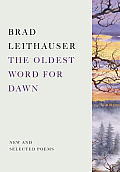
Leithauser’s fun for any number of reasons (that he wrote a novel in verse [among lots of other novels and collections of poetry], that his nephew happens to front a great rock band, that his wife is the phenomenal Mary Jo Salter), but I’ve actually not, until now, known much about his poetry—again, someone I know of but don’t know. Here’s to correcting as much as possible as often as possible. Here’s “Later”:
The goal I suppose is a steadied mind—
to replace with wood and stone
and insulated wire
what was contrived of flesh and bone,
blood and blood’s desire;
isn’t the final end to find
that have where where you are
matters as much to me
as whether or not, on another block,
the wind’s now ruffling a tree?
This sort of almost casual glory’s part of the Leithauser course: with language torqued heavily but far shy of pyrotechnics, Leithauser sketches mental processes, maps cognition, with a grace and ease that, at least to me, induces a sort of shuddering. In “Moon Over,” one of the new poems, he begins “Scuba divers will sometimes drown / within a night sea / after confusing up and down.” There’s consideration of several things, but then this, toward the end, is the big bell ringing: “He’s trapped / like a sleeper trapped in a raw, tightening / nightmare, who knows he knows a way out of here / though he keeps forgetting / the key. / How do we wake? How do we clear // the borne mind of its body and arrive—” That, as far as I can tell, is Leithauser’s North Star: the process of becoming, of mentally tuning fully in, of being 100% cognitively present. Which, of course, like everything re: poetry, sounds dumb to just write like that, but read the book—you’ll see. Read the book and see what he’s doing, and how much you might need it.


April 23, 2013
An Interview with Brian Kimberling and FREE BOOKS
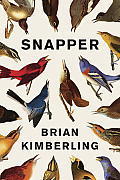 I’ve already written elsewhere about Brian Kimberling’s SNAPPER and how I think it’s one of the best books I’ve read in a long long time, but let me be quickly hyperbolic again: this thing’s just gloriously great. Tom Drury, years ago, came out with The End of Vandalism; Snapper is like a cousin to it. It’s a phenomenal book—I’ve already started reading it again and the thing’s barely out. Which brings us to this: I HAVE COPIES OF THIS BOOK TO GIVE AWAY–drop a line to wlcutter(at)hotmail.com by Friday night and I’ll do a drawing and send them out. Really, truly: you want this book. It’s all sorts of great. Below is an interview Kimberling and I did over email a month or so back (and here’s the op-ed he had in the NYTimes this past wknd).
I’ve already written elsewhere about Brian Kimberling’s SNAPPER and how I think it’s one of the best books I’ve read in a long long time, but let me be quickly hyperbolic again: this thing’s just gloriously great. Tom Drury, years ago, came out with The End of Vandalism; Snapper is like a cousin to it. It’s a phenomenal book—I’ve already started reading it again and the thing’s barely out. Which brings us to this: I HAVE COPIES OF THIS BOOK TO GIVE AWAY–drop a line to wlcutter(at)hotmail.com by Friday night and I’ll do a drawing and send them out. Really, truly: you want this book. It’s all sorts of great. Below is an interview Kimberling and I did over email a month or so back (and here’s the op-ed he had in the NYTimes this past wknd).
WC: I know books, particularly debuts, have all sorts of lineage, and stretch back and back in the author, but I’m curious if there were any overt references or works which had particular impact on Snapper (here’s how much I like the book, by the by: you mention Peter Taylor [a writer I assume has played some role here], and I’ve never read him [don’t judge], but he’s next on my list now, just because of what this fictional character of yours said). If you want to be more general and address larger/broader questions of influence or whatever, that’s fine, too.
BK: I wrote several plays that were staged in England. Attendance was poor and reviews were terrible, but the casts and crews and most of the audiences and I all enjoyed it. Before I wrote the plays my prose style was the result of imitating Peter Taylor and Katherine Anne Porter and Frank O’Connor for many years, and it didn’t really work. After the plays I had this new sense of comic timing, and I enjoyed writing dialogue, and I could do scene sans exposition much more easily than before.. I think the ways other characters frequently put Nathan in check owes something to my experience writing for the stage. I don’t think Snapper looks anything like PT or KAP or any other influence (J.F. Powers, Eudora Welty, Gogol, Lorrie Moore…I have mostly old school short story vertebrae). I do see, in Snapper, some insight gathered over many rehearsal hours in a black box theater watching the same things go wrong over and over again.
You asked about overt references or works, and I cited my own. I’m sure that’s bad manners, but the plays were important preparation, though I didn’t know that at the time.
While writing Snapper I was enrolled on the MA in Creative Writing at Bath Spa University. I worked closely with Tessa Hadley, who has an encyclopedic mind. I got a strange kick out of driving my clever little German car down quaint English country lanes while blasting Southern Butt Rock, e.g. Lynnyrd Skynnrd. Then I’d hop out and talk to Tessa for a few hours about Henry James. Somehow I managed to write a book containing both Audubon and ZZ Top. This was probably inevitable but not really planned. There’s a line I pinched from Milton in the first story and there’s Shakespeare and Hemingway and the Kinks and – it’s very allusive, but I don’t think any of the allusions carry disproportionate weight.
Unless you want to count southern Indiana itself as an overt reference or work.
WC: This is a purely jealous thing on my part: how much work did it take to get that Nathan’s voice? This may end up opening weird doors regarding autobiography and such (like: I don’t know you, but your bio’s got overlap with Nathan’s, so the reader’s bound to wonder), but the voice is what sells this whole thing, to me. I suppose, though, tied into that is the question of structure, which (to me) has so much to do with Nathan’s voice—this very sort of plained voice (as if he’s smarter and more fun than he’s letting on—as if his voice has been ironed a bit, even)(I don’t mean that at all critically: it reads to me as remarkably similar to the sort of voice Tom Drury pulled off magically in End of Vandalism, which is all-time top 5 for me, so) that seems to just follow whatever comes up, but, in fact, ends with a phenomenal structure.
BK: Very often I write in a kind of free verse at first, starting a new line whenever, just to make myself pay attention to cadence and internal rhyme and so on. Later I smudge it up into paragraph form. I’m sort of terrified of reading the book out loud in public, actually – “chrome-trimmed diner open twenty-four hours” is a tongue-twister. The subtitle or strapline I put on the original MS was “Accidents and Incidents in an American Hinterland” but you had to be Peter O’Toole to say it convincingly. In other words, it was a lot of work to get Nathan’s voice. Though I should add that I’ve been doing this free verse thing for so long (I picked it up from Peter Taylor) that it may be second nature. I also revise endlessly.
The whole thing structured itself. I didn’t write it sequentially, by the way, and I didn’t have a plan, but I noticed that the stories I was writing had started talking to each other and I just tried to follow the conversation. I think the structure makes the reader work a little more. Do you let Dart off the hook? Well, do you? I feel that somehow a more linear narrative would require more instruction, reliable or otherwise, from Nathan, about how to interpret things. The structure I used allowed me to pass questions to the reader instead of answers.
About the autobiographical element – it’s more like a strange dream I had than a reliable account of my life. I was a research assistant on a major songbird study, that’s true. I wasn’t very good at it, owing to a hearing impairment. But I was very envious of the people who were good at it; so much so I crafted my own little fantasy career in book form 17 years later.
This isn’t to say it’s not autobiographical. I grew up in Evansville, went to IU, and my dad is a math professor. I went to jail in much the manner described. There is a square mile. I didn’t travel around as Nathan does. I found a wood thrush nest out there a couple of years ago; it’s now in my parents’ garage (because how do you get something like that through Customs?) with a couple of red-eyed vireo nests (all collected in October, no longer in use). I could tell you which trees those birds’ great-great-great grandparents nested in and describe their morning routines. But the further I get from my square mile the less I know. I can’t ID British birds at all.
WC: Here’s a meatball of a Midwest question: the book reads very much as a love letter to Indiana, obviously. It also reads, specifically, as a love letter to a place one’s left—this couldn’t have been the story of someone who’d never left. I don’t know how to ask this but to just ask it: is the book what it feels like? Depending on Q2 this might lead right back into aspects of autobiography or whatever, but I’m curious.
It is a love letter to Indiana. They keep cleaning the place up (and knocking down forests) but when I was growing up all the crumbling infrastructure and desolate empty landscape – well, it was romantic. Evansville is the sort of place people leave – to get an education, a job, or a view of some hills. My friends from Evansville are now dispersed far and wide, bar one. And I think when we still lived there we all griped about it endlessly, but now we all agree it was a great place to grow up.
I suppose that autobiographically speaking I was partly wondering what it would have been like if I had stayed. Of course there are thousands of good people who don’t leave, who are still in southern Indiana or any other relative backwater. My parents, for example. That there are good people everywhere is one of the book’s main assumptions. That they can never get along together is another. A bunch of them are in prison.
I had to be in Britain to write it. I can take note of, say, US political dysfunction now and find it deeply fascinating, without getting irritated. If I lived there…
BK: I’m curious if you feel like this book has a recognizable home in the current literary fiction world. That probably sounds brutal or dumb; I don’t intend it to be. What I mean is it’s got stuff going on that make it, to me, harder to peg, to be able to say if-this-then-SNAPPER, you know? If someone likes Keillor, I might think this’d make them happy, but also if they liked Kelly Link, who I’d argue is wildly different from Keillor. It’s curious. Sorry to keep coming back to notions of background or whatever on it—I just, as a reader, felt like I was being given something very very new when I read this, or, if not new, at least something that’s not done terribly regularly, in the best ways.
I ask everybody this question myself – whether Snapper reminds them of anything else. The answer is almost always no, though “early Richard Russo” has come up more than once. I don’t know what sets it apart, and I’m probably not the best person to ask. I’ll take a crack anyway. A couple of cracks. First, there may be a genealogy starting with Winesburg, Ohio, that takes in Keillor’s Lake Wobegon and Donald Ray Pollack’s Knockemstiff – comical (sometimes) Midwestern novels-in-stories, cross-sections of distinct heartland communities.
Snapper is full of jokes, and it’s in a completely different time and culture, and nobody is going to read it and say, Henry James! But is it crazy to say that a highly digressive semi-reliable narrator who rarely comes to a point probably springs from some Jamesian tradition?
I am so thrilled by the cover, all those photoshopped Audubon birds. It suggests a historical continuity that is rare in the era of self-replicating media, or post-post-human studies, or whatever we’re in now. And, again, I didn’t plan this – the local history scattered throughout Snapper, right down to a paragraph in the middle about the unknown people who lived there 4000 years ago – that strikes me as different. The sense that the history of the area is actively informing the experience of the main character now – that’s a Southern influence, I think. I was very interested in the Agrarians at one point. The last line is downright pre-industrial. I wouldn’t call myself a Southern writer or Snapper a Southern book, but perhaps it’s a bit like Evansville as described in the book – subject to a unique combination of cultural and economic and geological influences that in subtle ways set it apart.
[By the way, a Presbyterian minister in Richmond, Virginia gave me In The Miro District by Peter Taylor when I was 17 to read on the flight back to Indiana. I tried the first story and found it extremely boring. I stared out the window for a while and found that even more boring. I tried another story called “Her Need” and it took the top of my head off. That book is where I’d start. Although In The Tennessee Country made me drop out of college. You can’t go wrong starting anywhere].


April 18, 2013
Bob Hicok’s ELEGY OWED
I’ve said before but must reiterate it: I’m fairly close to Bob and his work, so take the following with all necessary salt. I love the guy’s work, and have been in thrall to it for now a decade. I will admit to having had, in the mid-00′s, some struggle with his stuff—it took me a bit to get into Insomnia Diary and This Clumsy Living, both of which books, I believe, more than stand up, I just couldn’t see them that well on their release (I liked them enough, but didn’t necessarily feel them hugely). One of the hardest tricks about Hicok’s work, to my mind, is how similar it can seem, book-to-book: I know his stuff as well as I know any poet’s work, and even I’d have a hard time being able to identify the book if presented two or three poems. If you google some of his older stuff and read it along with current work, it can be fairly hard to track how things are actually changing, moving ahead, etc. This, anyway, was my take on his work, for a couple years.
But here’s the obvious big Q: why the fuck must writers change book to book, and, further, how could such change be measured as a value? I say this as someone who loveslovesloves Jorie Graham and Charles Wright, to say nothing of Billy Collins (is it still uncool to like his work? I came of age during a moment it seemed sort of cool to pooh-pooh his stuff, yet I’m riveted by it, find myself more drawn into it as the days pass), meaning I say this as someone who loves authors who, really, truly, don’t seem to be changing all *that* much book to book—the Graham of PLACE isn’t radically different, aside from lineation, from the Graham of NEVER: the obsessions might twist a bit, but are ultimately of the same blood. Please don’t read any of this as the scribblings of someone who sees no change in Wright’s or Graham’s work from book to book: Wright’s still in his backyard writing about trees and the Blue Ridge Mtns and Italy and etc., but, whatever the surface similarities, the poems are, ultimately, shifting and changing. This all gets super weird; I don’t believe I’m doing that good a job descibing this.
Look, here’s what I mean: in fiction, we celebrate writers we believe can radically change, effort to effort: Wallace was as praised for the multiplicity of voices and styles and forms he could swing as anything else, and folks like Lawrence Weschler and Jenny Boully and William Gaddis and Carole Maso and etc. etc. etc. all gravitationally pull the attention and praise they earn partly because they can twist and turn and try so many things in such a variety of ways, which of course is great. I just wonder, more and more, if poetry is the correct place for such a metric to even be brought into play: Stevens’s late poems are still obsessed with the same stuff as his early stuff, and are mostly written in the same language, same style, same everything. Dickinson blah blah blah. This is already dumb.
Anyway, Hicok: Elegy Owed is the new one, and it’s gorgeous, and Hicok’s first from Copper Canyon, and the book is moving and quiet and empathetic in ways his earlier stuff was in a flinty, theoretical way. It wasn’t that anything was or wasn’t great before; merely that the work in Elegy simply *feels* more, feels stronger, more emotionally present, emotionally responsive. Of course, aspects of Elegy Owed are of-a-piece and muscled similarly as his earlier work: the funniness, the wordplay, the remarkable lines of thought that feel as if they’re simultaneously moving the reader both into and out of something. The experience is, I think, staggering. Here’s one from the book that’s up at The Awl:
Elegy with lies
This lost person I loved. Loved for a hundred years.
When I find her. Find her in a forest. In a cabin
under smoke and clouds shaped like smoke. When I find her
and call her name (nothing) and knock (nothing)
and build a machine that believes it’s God and the machine
calls her name (nothing) and knocks (nothing).
When I tear the machine down and she runs from the cabin
pointing a gun at my memories and telling me
to leave, stranger, leave, man of hammers.
When I can’t finish that story. When I get to the gun
pointed at my head. When I want it to go off.
When everything I say to anyone all day long
is bang. That would be today. When I can’t use her name.
All day long. Soft as cotton, tender as kiss. Bang.
It’s a gorgeous poem: tricky, both giving and withholding, and one that draws the reader into an act of recognition (with lots of things: recalling someone loved, the feeling that “everything I say to anyone all day long / is bang. That would be today,” etc.) even as the reader’s just following along. This, for my money, is the glory of great poetry: the way it gives and asks equally, and Hicok’s been doing it, balancing that unbelievably difficult task, for decades now.
What’s more impressive about Elegy Owed, however, is how sad it is. Maybe not sad: maybe aware of mortality; the whole thing written with a keener understanding/reckoning of the vale of tears that is this temporal existence and etc. It’s not a trick or glibness or a joke, the title: the book is elegaic, certainly, but it’s also, because it’s Hicok, celebratory, reveling in the fact and act of living without once feeling untoward or rude or gross about such celebratory stuff and such sad stuff being back-to-back. The first line I fell for in Hicok’s stuff is from an early poem called “Waiting for UPS” and he wrote “I’m not good at waiting which means I’m not good at being alive.” The sadness of that line’s still around but it’s been clarified now, hardened and crystalized, deepened by the waiting that living entails, and the living that waiting entails. The new book’s got a sort of mature sorrow that’s knee-buckingly gorgeous, and further, it’s this sort of remarkable (to me) firecracker: Hicok’s getting better and better. I don’t want to make too much of a deal about this, but, especially with art, especially with poetry, there’s always the feeling that what you’ve just read is as good as it’ll get, always the fear that a poet’s found her voice or whatever, and that’s that: you’re set for a lifetime of sort-of retreads. Maybe I’m the only person who gets anxious about stuff like that. All I’m trying to say is Hicok is one of those poets who’s getting and going deeper into his work, and who’s cranking out better and better stuff as the years pass. If that seems easy or not amazing to you, sit down and write a poem today, and then write another one tomorrow, and keep doing it for twenty years, and see how much better you get. It’s a phenomenal power he’s built up and is wielding. You’re a fool to miss a minute of it.


April 15, 2013
Lara Santoro’s ‘The Boy’ Needs to Grow the Hell Up
The Boy by Lara Santoro
 I like to think of myself as a pretty progressive guy. I mean, I’m no Ghandi or anything, but I try to be open-minded and empathetic. And so whenever I have a particularly strong reaction to a book by a female author, either good or bad, I always ask myself if I would have felt the same had it been written by a man. It’s a fair question for those of us interested in overcoming the biases that prevent us from viewing any work of art from the proper objective distance, and I’m certainly not above acknowledging that being a 30-something white middle class dude has most likely affected my worldview in any number of unfortunate ways. And in the case of Lara Santoro’s The Boy, the question seems especially pertinent considering that, man, I hated this book.
I like to think of myself as a pretty progressive guy. I mean, I’m no Ghandi or anything, but I try to be open-minded and empathetic. And so whenever I have a particularly strong reaction to a book by a female author, either good or bad, I always ask myself if I would have felt the same had it been written by a man. It’s a fair question for those of us interested in overcoming the biases that prevent us from viewing any work of art from the proper objective distance, and I’m certainly not above acknowledging that being a 30-something white middle class dude has most likely affected my worldview in any number of unfortunate ways. And in the case of Lara Santoro’s The Boy, the question seems especially pertinent considering that, man, I hated this book.
It isn’t because our main character Anna is a reprehensible person; quite frankly, I usually enjoy people like this in books. Bad people generally make for interesting characters, in my experience. But a bad person is far different from a bad character, which is what Anna is. And I mean really bad.
Here’s the situation: After a bitter divorce, Anna has abandoned her career as a photojournalist and relocated from Africa to New Mexico with her eight-year-old daughter Eva and their sort-of live-in housekeeper Esperanza. At a party hosted by her neighbor Richard Strand, Anna meets Jack, Strand’s twenty-year-old son, who is instantly infatuated with her. Anna manages to keep him at bay for a little while, but soon enough the two strike up a torrid sexual relationship, much to the disgust of Richard and Eva.
Notice I’m saying “sexual relationship” here and not “affair”; the latter, it seems, would indicate a degree of secrecy. But there’s nothing secret about Anna’s and Jack’s involvement (and let me be clear that the relationship itself is not the problem here; it’s actually the most interesting thing about the book, even despite the fact that Santoro devotes an oddly small amount of attention to it). Quite the opposite, in fact. Anna seemingly goes out of her way to broadcast it, all the while believing that she is somehow a victim in the ordeal: “I have zero control here,” she complains to Strand when he politely asks her to end the relationship. When Jack moves in, despite her daughter’s and Strand’s protestations, she appeals to a close friend for advice, and then promptly ignores it, as she does the advice from her shrink: “What about me?” she replies. “Who takes care of me?…I have been constrained beyond all reasonable parameters. I have been enslaved, shackled like some goddamned convict and I’m tired. I need this.”
Enslaved? Shackled? Anna does not work, not like the rest of us anyway. She lives in a comfortable split-level with her daughter, who is closer to the housekeeper than she is with her mother. Her ex-husband lives in England. Ostensibly, her life is free of the kind of strictures that such a claim might suggest, including any abstract framework of white supremacist capitalist patriarchy.
The problem for me, then, isn’t whether or not Anna actually believes these things, it’s whether Santoro does. Several reviews have praised The Boy for its depiction of Anna’s “downward spiral,” but downward from what? What are the circumstances that compell Anna to behave so horribly to everyone around, to blame her daughter when pothead Jack stops returning her calls, to load the child into her car for a drunk driving spree and then, after totaling the car and landing Eva in a coma, preoccupying herself with making sure that her ex–by all indications stable and blissfully devoted to his daughter–doesn’t file for sole custody?
For me, there are three possibilities here:
 1.) Santoro actually intended The Boy to be read as an absurdist exercise in existentialism, a la The Stranger, whereby the main character’s utter lack of conscience and/or personal identity illuminates some aspect of our conceptions of meaning and morality. Except that Anna does have a conscience, she does have feelings, and she does understand right and wrong. There are numerous instances in which this is elucidated for us. But for whatever reason, she chooses to disregard her understanding of these things. Why is anyone’s guess; she isn’t lonely, nor does she feel particularly fond for Jack.
1.) Santoro actually intended The Boy to be read as an absurdist exercise in existentialism, a la The Stranger, whereby the main character’s utter lack of conscience and/or personal identity illuminates some aspect of our conceptions of meaning and morality. Except that Anna does have a conscience, she does have feelings, and she does understand right and wrong. There are numerous instances in which this is elucidated for us. But for whatever reason, she chooses to disregard her understanding of these things. Why is anyone’s guess; she isn’t lonely, nor does she feel particularly fond for Jack.
2.) The story is meant to be read through a feminist lit lens by which we see that our main character’s flatness and emotional immaturity is really evidence of her being empowered, actively bucking against the conventions of the male-centered Western narrative structure. But this too seems unsatisfying, not to mention insulting to actual feminist lit: clearly, Anna is disappointed by motherhood and the general malaise of suburban life, which isn’t unreasonable. But this isn’t enough of a catalyst to transform unrepentant cruelty and selfishness into some virtue of postmodernism. Rather, it just feels like bad character development.
3.) The final and most plausible explanation I can think of is that Santoro really did just want to craft the most unlikable character she could. In which case, bravo, well-done. Artwise, I can actually see the value in attempting something like this, if only because it sends dudes like me scurrying to their blogs to whine about it. But then, it doesn’t offer readers anything to take away. The Boy doesn’t do anything you haven’t seen before, other than ignore that pesky notion of character development. You’re better off downing a couple painkillers and watching reruns of Two and a Half Men or Sex and the City: sure, both are equally tawdry and mindless, but at least stuff actually happens.


April 1, 2013
Eh : Fiction
Flimsy Little Plastic Miracles by Ron Currie Jr.
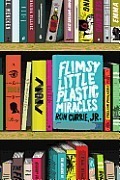
This book is weird: it’s would be easy to love as an actual reading experience—as just a propulsive page-after-page book—but the thing’s an attempt at a mediated metafictional thing: the character is named Ron Currie Jr, and this book’s presented as this attempt to be totally true and honest. On the title page it read “A True* Story,” and the asterisk is noted on the page prior, and the book opens with the narrator addressing, directly, the reader, and being supposedly 100% straightforward and direct and clear. The problem’s that, at present, I’m so fucked when people try to tell me they’re being honest that I don’t believe it (plus there’s this whole other weird aspect: writing a novel’s fucking hard, and I have to assume that close to 100% of novels written are ultimately informed by what the author feels is true and real—that’s one of the big joys of a novel, finding a way to transmit such inside truths—so to have an author go on and on about the fact that the book’s true or real, or predicated on true/real feelings, feels…weird, I guess).
Anyway, here’s the story: Ron Currie Jr skips to a Carribean island to make space for his beloved Emma (hard not to think Bon Iver much?), a girl he’s crushed on since his youth. She needs space because she loves him but is a fucking wreck and needs to divorce this other guy. Currie spends his days drinking and getting in fights, and, eventually, he doesn’t die even though his car goes into the ocean, and so people think he’s dead, and the writing on his computer’s fake-posthumously published, and he’s a massive hit, and etc. etc. etc. His dad also dies. I don’t want to sound like a prick: I liked the book when it wasn’t playing so many games, trying to jostle things around. When the fictional Currie’s dad dies, it’s just heartbreaking. There are, I’m trying to say, deeply felt things in here. But here’s the thing: on the book’s very last page, Currie/Currie reaches directly to the reader, asking “I hope you’re the one sitting there next to me and I can say: Did you feel that, just now? Like the smallest, briefest Earthquake?” There’s nada wrong with reaching directly for the reader—Invisible Man‘s end is flawless, and its you stabs the reader—but the narrator asking us if we felt it? It seems—to me anyway—needy, hopeful but desperate. It feels uncomfortably intrusive. Again: there’s a great book here when it’s not being fucked and played with. One almost feels like: just tell the fucking story. Who knows. Maybe I’m now officially an old old man.
A Map of Tulsa by Benjamin Lytal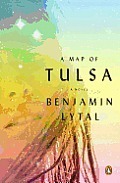
I wanted to like this book so much. I loved the old 2-page story Lytal had in McSweeney’s whatever, way back. I was so excited about this book. I am, after having read it, no longer excited about or by this book. I don’t have anything great to say about it. It read as an overwrought turgidity, and I regret my enthusiasm. It’s a coming of age story and the language is enough to sink you, and Jim, the narrator, takes himself so fucking seriously you may (like me) read the whole thing with Louie CK’s voice in your head going white people’s problems. Here’s an example of the prose: “Jenny sat on a step below me and I started to tell her about the banister: turned wood uprights carved into the shape of pineapples, and beneath the pineapples some other kind of wooden flourishment. She was really paying attention. The only way I could explain it to her, I said, was the way toy soldiers would use the banister to convey themselves down if they were invading the ground floor, swinging from pineapple to pineapple with grappling hook and line. Sometimes, alas, plummeting away to the soft carpet below. Poof. And then silence.” Knock yourself out if such rings your cherries: the whole book felt to this reader exactly like that passage, stuff gone into great and detailed length which had the odd effect of making me feel like I understood it less than I would have without Lytal’s language.



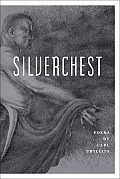 Silverchest by Carl Phillips
Silverchest by Carl Phillips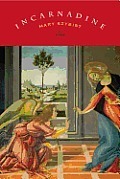
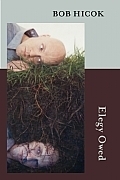 Elegy Owed by Bob Hicok
Elegy Owed by Bob Hicok

